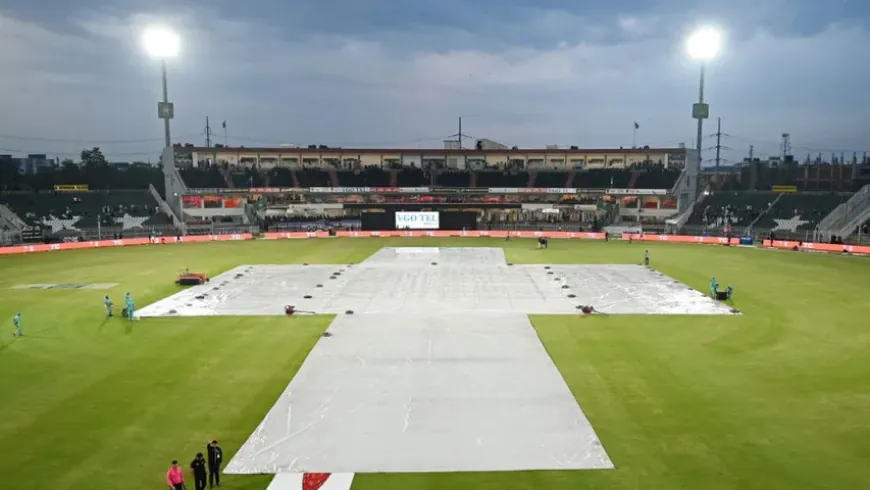PCB Under Fire for Inept Stadium Arrangements as Champions Trophy Match Washes Out
PCB comes under severe criticism for unsatisfactory stadium arrangements after a decisive ICC Champions Trophy 2025 match is washed out. Fans and experts hold poor drainage and mismanagement responsible for disrupting the tournament calendar.

The much-expected Champions Trophy 2025 match between Australia and South Africa at the Rawalpindi Cricket Stadium ended in despair as it was called off without even a single ball being bowled because of relentless rain. What added to the dismay was the visible lack of proper ground protection, which raised serious doubts regarding the Pakistan Cricket Board's (PCB) readiness to stage such a high-profile tournament. The incident has attracted criticism from fans and former cricketers alike, with former Indian cricketer Mohammad Kaif going public against the PCB's supposed misappropriation of funds.
A Match Lost to the Rain and Poor Planning
The South Africa-Australia match was to be an exciting encounter, with both sides keen to consolidate their positions in the tournament. But constant rain in Rawalpindi meant that even the toss was not possible. What raised many eyebrows was the poor ground coverage at the stadium, with only the pitch and surrounding areas covered, leaving huge areas of the outfield vulnerable to waterlogging.
Critics point out that with adequate foresight and investment in ground preparation, the match might have stood a chance of being played. The incident has again raised questions about whether Pakistan is really capable of hosting an event of this scale, especially after a gap of almost three decades. The last major ICC event held in Pakistan was the 1996 Cricket World Cup, which was co-hosted with India and Sri Lanka. International cricket has been missing from the country since then because of security issues, with teams visiting only for bilateral series in recent times.
Mohammad Kaif Criticizes PCB's Handling of ICC Funds
Former Indian cricketer Mohammad Kaif did not mince words in reacting to the development. Taking to social media platform X (previously Twitter), Kaif uploaded a photo of the Rawalpindi Cricket Stadium with enormous sections of the ground uncovered.
"It's unfortunate the Rawalpindi ground is not covered fully. Such a crucial match - South Africa v Australia - could go to waste because nobody discussed this problem. Was the ICC funds spent sensibly by the hosts?" Kaif asked in his post.
His remark created a relevant issue—how the money from the ICC for stadium preparations was spent. Since Rawalpindi had already been marked out for its unpredictable climate, a lack of installing complete rain protection measures is regarded as a grave lapse by PCB officials.
The Bigger Picture-PCB Under Pressure
The cancellation of the Australia vs South Africa game is not a one-off. The Rawalpindi Cricket Ground has been in the news for reasons other than politics and violence. Its poor drainage system is one such reason. The problem becomes more urgent considering that Pakistan is scheduled to play Bangladesh at the same ground. If that game too gets cancelled due to rain, Pakistan's tour will end without winning a single game on home turf—a nightmare scenario for the host country.
In addition, Pakistan's performance in the tournament has already been disappointing. They were humiliated by New Zealand by 60 runs in their first match, and then lost to their traditional rivals India by six wickets in Dubai. Consequently, they have already been knocked out of the semi-final contention, and the match against Bangladesh in the next match is now strictly a matter of pride.
Stadium Renovation Woes and Last-Minute Preparations
The insufficient preparations in Rawalpindi also contributes to the PCB's overall plight in getting ready for the Champions Trophy. Throughout the months preceding the competition, critical delays in the restoration of three major stadiums—Rawalpindi Cricket Stadium, Gaddafi Stadium in Lahore, and National Stadium in Karachi—haunted the country. These upgrades were important to guaranteeing that Pakistan was able to host the Champions Trophy successfully, but the ultimate preparations were finished only two weeks prior to the tournament's opening.
Although all three grounds ended up being operational, the expedited nature of the upgrades possibly created deficiencies in important infrastructure such as drainage and pitch upkeep. This has contributed to further debates regarding PCB's overall management and whether it is capable of supporting such massive events.
The Call for Accountability and Better Infrastructure
The Rawalpindi events are a wake-up call for the PCB. If Pakistan wants to host international tournaments in the future, the board needs to address basic issues regarding stadium infrastructure, match-day procedures, and weather preparedness. Other cricket-playing nations like India, Australia, and England have spent big on sophisticated drainage systems and full-ground covers, cutting the likelihood of rain causing matches to be abandoned to near zero.
The complaint by Mohammad Kaif and other experts is not only about one left-out match; it is about the general inefficiencies of Pakistan's cricket management. The PCB needs to ensure that the money offered by the ICC is spent efficiently in order to establish world-class infrastructure. Otherwise, Pakistan will be deprived of future chances to stage big tournaments since issues regarding infrastructure and planning will still persist.
Looking Ahead
As long as the Champions Trophy 2025 is ongoing, the PCB has a chance to mend its ways in the rest of the matches. Bringing some instant match-day logistics fixes and a stadium facilities review may restore some of the reputation that has been damaged. Getting the next Pakistan vs Bangladesh match up and running without hiccups—subject to weather conditions—will also prove pivotal in the quest to rebuild trust among stakeholders and fans alike.
In the long term, Pakistan cricket needs to learn from these failures and put more emphasis on long-term planning instead of knee-jerk measures. Then and only then can the nation properly establish itself as a trustworthy host for major ICC events in the years to come.





















































